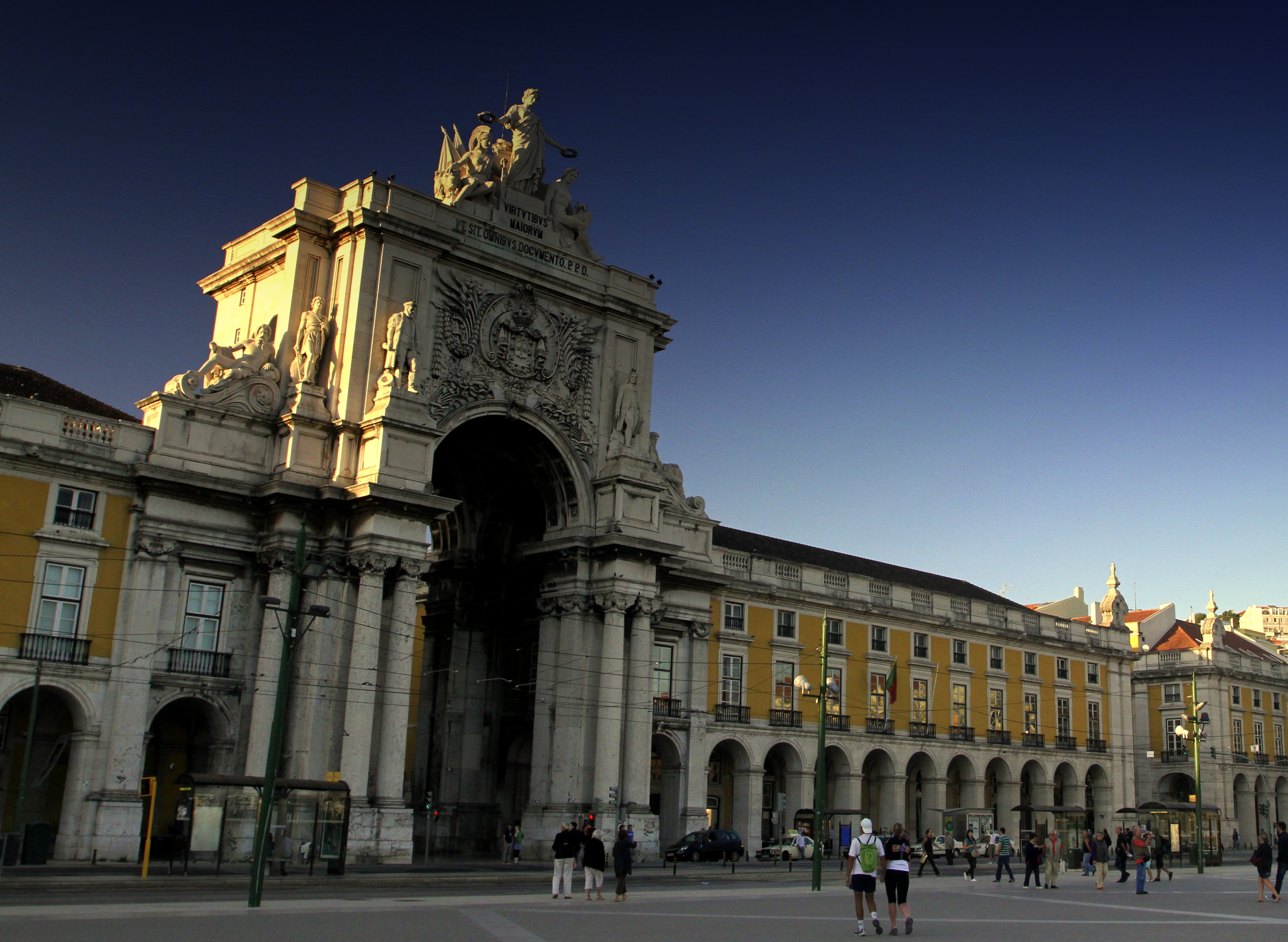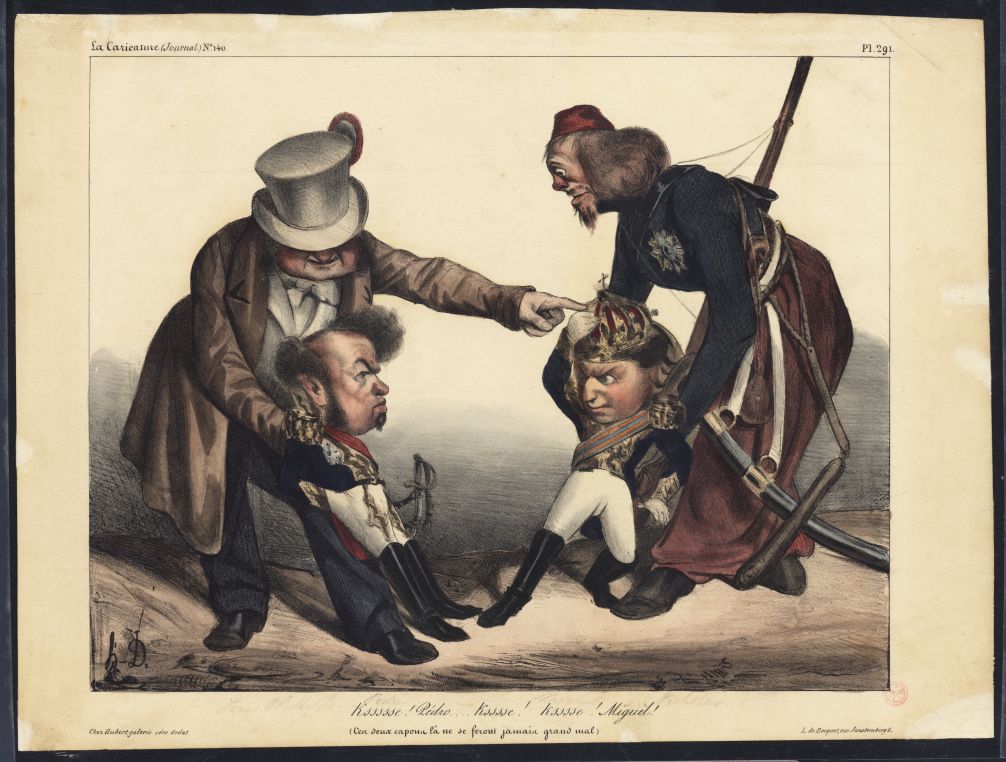|
Constitutional Charter Of 1826
The Charter of 1826 or ''Carta Constitucional'', often simply referred to as the ''Carta'', was the second constitution in Portuguese history. It was given to the country in 1826 by King Dom Pedro IV. The constitution remained in force, with the exceptions of the periods 1828–1834 and 1838–1842, until the fall of the monarchy in 1910. It was modified in 1852, 1865, 1896, and 1907. The constitution was modelled on the 1824 Brazilian constitution that Pedro imposed on the country, which in turn was modelled on the failed 1822 Portuguese Constitution, which in turn was modelled on the Spanish Constitution of 1812. In contrast to the first constitution, the Portuguese Constitution of 1822, approved by the constitutional assembly or cortes (see the Liberal Revolution of 1820), the ''Carta'' was an imposed constitution issued by the king under his own authority without the involvement of the people. The ''Carta'' provided for a bicameral Parliament. The upper chamber, modeled a ... [...More Info...] [...Related Items...] OR: [Wikipedia] [Google] [Baidu] |
Cartista
Cartista was a Portuguese ideology which arose after the Portuguese Liberal Revolution of 1820. Members supported the Constitutional Charter of 1826 granted by Peter IV of Portugal, which was an attempt to reduce the conflicts created by the revolution. This was a less radical charter than the Constitution of 1822. Portuguese Chartism was quite different from both European and British Chartism, and was in some ways antithetical, as they believed in a liberal-conservative ideology. A scathing contemporary description defined them as either personal enemies of Dom Miguel, or were simply acting out of self-interest. By 1851, the Chartists successfully carried out a military coup against Costa Cabral. The party became part of a power-sharing agreement with Partido Progressista, which became the basis of the system of "rotativism", where they took turns ruling Portugal Background Following the Peninsular War, when the monarchy had remained transplanted in Brazil and continental Po ... [...More Info...] [...Related Items...] OR: [Wikipedia] [Google] [Baidu] |
1826 In Portugal
Events in the year 1826 in Portugal. Incumbents *List of Portuguese monarchs, Monarch: John VI of Portugal, John VI (until 10 March); Pedro I of Brazil, Peter IV (until 2 May); Maria II of Portugal, Mary II Events Arts and entertainment Sports Births *8 May – Miguel Ângelo Lupi, painter (died 1883 in Portugal, 1883) *27 November – António Augusto Soares de Passos (died 1860 in Portugal, 1860) Deaths *10 March – John VI of Portugal, king (born 1767 in Portugal, 1767). References {{Year in Europe, 1826 1826 in Portugal, 1820s in Portugal 1826 in Europe, Portugal Years of the 19th century in Portugal 1826 by country, Portugal ... [...More Info...] [...Related Items...] OR: [Wikipedia] [Google] [Baidu] |
19th Century In Portugal
19 (nineteen) is the natural number following 18 and preceding 20. It is a prime number. Mathematics Nineteen is the eighth prime number. Number theory 19 forms a twin prime with 17, a cousin prime with 23, and a sexy prime with 13. 19 is the fifth central trinomial coefficient, and the maximum number of fourth powers needed to sum up to any natural number (see, Waring's problem). It is the number of compositions of 8 into distinct parts. 19 is the eighth strictly non-palindromic number in any base, following 11 and preceding 47. 19 is also the second octahedral number, after 6, and the sixth Heegner number. In the Engel expansion of pi, 19 is the seventh term following and preceding . The sum of the first terms preceding 17 is in equivalence with 19, where its prime index (8) are the two previous members in the sequence. Prime properties 19 is the seventh Mersenne prime exponent. It is the second Keith number, and more specifically the first Keith p ... [...More Info...] [...Related Items...] OR: [Wikipedia] [Google] [Baidu] |
Defunct Constitutions
{{Disambiguation ...
Defunct may refer to: * ''Defunct'' (video game), 2014 * Zombie process or defunct process, in Unix-like operating systems See also * * :Former entities * End-of-life product * Obsolescence Obsolescence is the process of becoming antiquated, out of date, old-fashioned, no longer in general use, or no longer useful, or the condition of being in such a state. When used in a biological sense, it means imperfect or rudimentary when comp ... [...More Info...] [...Related Items...] OR: [Wikipedia] [Google] [Baidu] |
Liberalism In Portugal
Since the beginning of liberalism in Portugal in the 19th century, several parties have, by gaining representation in parliament, continued the liberal ideology in contemporary Portuguese politics. But after the initial fervor of the Liberal Revolution of 1820 and the outcome of the Liberal Wars (1828–1834) during the 19th century, liberalism was relegated to a secondary role in Portuguese politics and government and even outlawed for periods of time. The first fully-fledged liberal party (a political party professing classical liberalism including pro-market, business-friendly economic liberalism, small government and individual freedom as core tenets of its ideology) founded as such to have a seat in the Portuguese Parliament since the end of the First Portuguese Republic (1910–1926), was the Liberal Initiative, in 2019. History 1826 to 1926 From Democratic Group to New Progressive Party *1826: Supporters of the liberal revolution of 1820 establish the Democratic Group (' ... [...More Info...] [...Related Items...] OR: [Wikipedia] [Google] [Baidu] |
Law Of Portugal
The Law of Portugal is part of the family of what in English-speaking countries are sometimes called the " civil law" legal systems, referring to legal systems that developed at least in conversation or close ties with systems influenced by the ius commune medieval European tradition of Roman law (however, Scandinavian legal systems are often counted as such, despite the former not penetrating in influence, as opposed to local North Germanic customary law). As such, it has many common features with the legal systems found in most of the countries in Continental Europe. Along its history, the law practiced in Portugal started to be based in the customary law of the indigenous peoples that initially occupied the region, that was later influenced by the Roman and Visigothic laws. From the 13th until the 18th centuries, the main influence was the Justinian and Canon laws. In the 18th century, the main influence started to be the natural law. CAETANO, Marcello«História do Direito ... [...More Info...] [...Related Items...] OR: [Wikipedia] [Google] [Baidu] |
Government Of Portugal
A government is the system or group of people governing an organized community, generally a state. In the case of its broad associative definition, government normally consists of legislature, executive, and judiciary. Government is a means by which organizational policies are enforced, as well as a mechanism for determining policy. In many countries, the government has a kind of constitution, a statement of its governing principles and philosophy. While all types of organizations have governance, the term ''government'' is often used more specifically to refer to the approximately 200 independent national governments and subsidiary organizations. The main types of modern political systems recognized are democracies, totalitarian regimes, and, sitting between these two, authoritarian regimes with a variety of hybrid regimes. Modern classification systems also include monarchies as a standalone entity or as a hybrid system of the main three. Historically prevale ... [...More Info...] [...Related Items...] OR: [Wikipedia] [Google] [Baidu] |
Timeline Of Portuguese History
__NOTOC__ This is a timeline of Portuguese history, comprising important legal and territorial changes and political events in Portugal and its predecessor states. To read about the background to these events, see History of Portugal. Centuries: 3rd BC 2nd BC 1st BC 3rd 5th 6th 8th 9th 10th 11th 12th 13th 14th 15th 16th 17th 18th 19th 20th 21st 3rd century BC 2nd century BC 1st century BC 3rd century 5th century 6th century 8th century 9th century 10th century 11th century 12th century 13th century 14th century 15th century 16th century 17th century 18th century 19th century 20th century 21st century References Bibliography ;in English * * * * * * * ;in Portuguese * . 1885? * * External links * * {{cite web , url= https://www.metmuseum.org/toah/chronology/#?geo=eu, title= Iberian Peninsula , work= Heilbrunn Timeline of Art History , publisher= Metropolitan Museum of Art , ... [...More Info...] [...Related Items...] OR: [Wikipedia] [Google] [Baidu] |
Portuguese Civil Code
The current Portuguese Civil Code () was approved on 26 November 1966 and entered into force on 1 June 1967. It replaced the previous Portuguese Civil Code of 1868. Its text was prepared by a Commission of Professors of Law which in its final phase was presided and substantially changed by Professor Antunes Varela, which is why it is often referred to as "Varela's Civil Code" as opposed to "Seabra's Civil Code", the previous Civil Code of Portugal which preparation commission was presided over by the Viscount of Seabra and entered into force precisely one century before the new code was enacted in 1967. However, due to Professor Vaz Serra's important contributions, the Portuguese Civil Code is often also referred to as "Vaz Serra's Civil Code", specially by authors from the Faculty of Law of the University of Lisbon. Structure The Code adopted the German classification of areas of Civil Law, following the BGB, and is divided into 5 main parts (or "books"): # the General Par ... [...More Info...] [...Related Items...] OR: [Wikipedia] [Google] [Baidu] |
Portugal
Portugal, officially the Portuguese Republic, is a country on the Iberian Peninsula in Southwestern Europe. Featuring Cabo da Roca, the westernmost point in continental Europe, Portugal borders Spain to its north and east, with which it shares Portugal-Spain border, the longest uninterrupted border in the European Union; to the south and the west is the North Atlantic Ocean; and to the west and southwest lie the Macaronesia, Macaronesian archipelagos of the Azores and Madeira, which are the two Autonomous Regions of Portugal, autonomous regions of Portugal. Lisbon is the Capital city, capital and List of largest cities in Portugal, largest city, followed by Porto, which is the only other Metropolitan areas in Portugal, metropolitan area. The western Iberian Peninsula has been continuously inhabited since Prehistoric Iberia, prehistoric times, with the earliest signs of Human settlement, settlement dating to 5500 BC. Celts, Celtic and List of the Pre-Roman peoples of the Iberia ... [...More Info...] [...Related Items...] OR: [Wikipedia] [Google] [Baidu] |
Liberal Wars
The Liberal Wars (), also known as the Portuguese Civil War () and the War of the Two Brothers () was a civil war in Portugal that lasted from May 1828 to May 1834, fought between liberal progressive constitutionalists (led by former King Pedro IV) and conservative traditionalists (led by King Miguel I) over the country's system of government and royal succession. Embroiled parties included the Kingdom of Portugal, Portuguese rebels, the United Kingdom, France, the Catholic Church, Spain and Russia. Roots of the conflict The death of King John VI in 1826 created a dispute over royal succession. While Dom Pedro, the Emperor of Brazil, was the king's oldest son, his younger brother Miguel contended that Pedro had forfeited his claim to the throne by declaring Brazilian independence and by declaring war on the Kingdom of Portugal, therefore violating the succession rules mentioned in the Fundamental Laws of the Kingdom. Pedro briefly entitled himself King Pedro IV of P ... [...More Info...] [...Related Items...] OR: [Wikipedia] [Google] [Baidu] |


